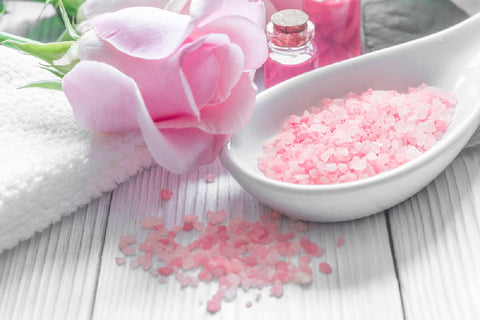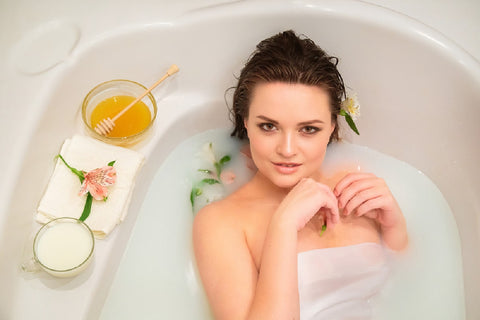There's something special about self-care; it gives you the ultimate relaxation. One way to refresh and pamper yourself is by taking a super amazing bath day with some wildly fragrant and relaxing bath salts. Out of all the fragrances you would ever try, rose comes up as our favourite.

But we also know that the rose bath salts you get in the market are quite expensive, and on top of that, you are not even sure whether it's just rose fragrance or they have actually added something related to rose in it or not. So, why get into that confusion when you can craft your rose bath salts at home? Yes, you can do that and this is what we will be discussing today. We will dive into the benefits of rose bath salts, how you can make one and what makes it so special.
Benefits Of Rose Bath Salts
Before we share the recipe for making rose bath salts at home, you must learn what makes it special. For that, we have compiled a list of benefits of rose bath salts. These benefits will surely convince you to add this unique skincare ingredient to your self-pampering routine. Here are the top benefits of Rose Bath salts.
1. Relaxation & Stress Relief
One of the biggest benefits of any bath salt is that it offers relaxation and stress relief. The great combination of rose petals and essential oils is known for its calming properties.

So, when you soak yourself in a tub infused with rose bath salts, you can ease tension, reduce stress and promote a sense of tranquillity.
2. Skin Nourishment
Another great benefit of rose bath salts is skin nourishment. The beautiful rose bath salts contain many skin-nourishing ingredients like rose petals and Epsom salts. These mineral-rich salts help offer intense hydration to the skin. It may also offer gentle exfoliation that leaves your skin supple, smooth, and soft.
3. Aromatherapy Advantages
How can we forget the mesmerizing fragrance of rose petals? The fragrance is not only pleasing but also quite mood-uplifting. When you inhale the rose fragrance during rose bath salt, it improves mood, combat fatigue and creates a spa-like atmosphere in your bathroom. This way, you can enjoy a perfect self-pampering day.
4. Muscle Joint & Pain Relief
Many bath salts, including those with rose, incorporate Epsom salts.

You might not know, but Epsom salts are known to ease discomfort in muscles and joints, making a rose bath a perfect way to unwind after a tough workout or a long day.
5. Luxurious Self-Pampering Experience
Last but not least benefit of rose bath salts is the amazing and luxurious self-pampering experience they offer. When you take a rose bath, it completely transforms your bathroom into a mini spa. The subtle rose scent combined with warm water offers you skin-softening properties and creates a truly luxurious self-care ritual.
How To Make Rose Bath Salts
Now that you know the amazing benefits rose bath salts offer, it's time you learn how to make it on your own to enjoy the self-care experience. After all, the bath salts you will be using to make this DIY bathing product will offer umpteen benefits to your body and skin. Here's what you need to make rose bath salts at home.

Ingredients:
- Sea Salt - ½ Cup
- Some Rose Petals
- Vitamin E Oil - 5 Drops
- Pink Himalayan Salt - ½ Cup
- Small Mason Jar For Storage
- Rose Essential Oil - 10 Drops
Directions:
Step 1: Mix the salts in a medium-sized mixing bowl. Stir until they are well combined.
Step 2: Add in the rose essential oil. I use about 10 drops. Adjust the amount based on your preference.
Step 3: If using vitamin E oil, add it in now. Stir with a wooden spoon until the essential oils and vitamin E oils are mixed with the salts.

Step 4: Add in rose petals. Transfer to small muslin bags or a mason jar for storage.
Frequently Asked Questions
We tried to answer all your queries in the above content about rose bath salts. However, if you still have some questions you can refer to our below-mentioned Frequently Asked Questions section.
Q: How Do You Dry Roses For Bath Salts?
Ans: There are two main ways to dry roses for your bath salts: air drying and oven drying. Whichever method you choose, the dried rose petals should be brittle and crumble easily when you crush them between your fingers. Once dry, you can use them in your homemade rose bath salts!
Q: Can You Use Rose Water In Bath Salts?
Ans: Yes, you absolutely can use rose water in bath salts! In fact, it can be a great way to enhance your homemade bath salts. Adding rose water to bath salts offers increased rose fragrance and potential skin benefits.
Q: How Do You Make Rose Petal Bath Salt?
Ans: One simple way to make rose petal bath salt is this way. Combine dried rose petals, Epsom salts, and your favourite carrier oil for a fragrant bath!
Conclusion
In Conclusion, we can say that making your rose bath salts is one of the best ways to ensure that you enjoy a luxurious self-care ritual whenever you want. The biggest benefit of making your DIY skincare and self-care products is that you know the ingredients you are adding, and as a result, you don't have to worry about any side effects. So, it's time to go ahead and make your DIY rose bath salts and indulge in the best self-pampering experience.












 Sign in
Sign in Register now
Register now My Reward Points
My Reward Points









